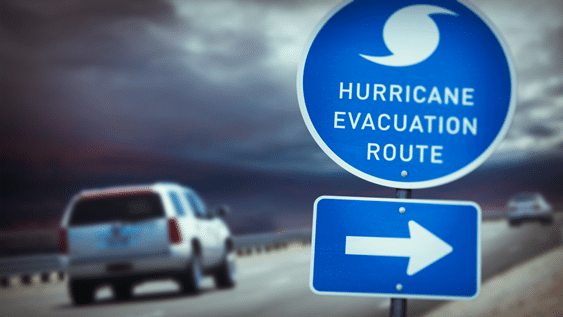How to Stay Safe on the Road During Hurricane Evacuations
Friday, November 11, 2022 9:00 AM

As our neighbors to the south recover from the flooding and catastrophic property damage brought on by Hurricane Ian, we are reminded that evacuations are not something to be taken lightly. Staying put when you are told to evacuate is not only against the law but could also be dangerous. Therefore, it is in your best interest to obey the evacuation call.
The near-daily storms that mark Florida’s fall make it dangerous for motorists. In addition, sudden storms can cause blinding rains, decreased traction, and flooding, challenging even the most experienced drivers. If you must drive during a hurricane evacuation, follow these tips to reach your destination safely.
Hurricane Evacuation Driving Tips
Always Buckle Your Seat Belt
The National Highway Traffic Safety Administration (NHTSA) says that buckling your safety belt is one of the most important things you can do, whether you are the driver or passenger. According to the agency, seat belts saved 14,955 lives in 2017. Unfortunately, more than 27 million people don’t use a seatbelt, even though they can save lives. 58% of people who died in nighttime traffic accidents in 20202 did not wear a seatbelt.
Watch Your Speed
If you drive too fast for road conditions, your vehicle may hydroplane. Hydroplaning is most dangerous in the first 10 minutes after a rainstorm because oil residue from the road is mixed with water and has no chance of running off. Hydroplaning can occur when a car travels at 35 mph.
Prepare for Broken Traffic Signals
High winds can cause signs and signals to be damaged. Do not assume you have the right-of-way when approaching an intersection. An intersection without signage should be treated as a four-way stop. The police may only be able to direct traffic at some intersections in the area. It’s up to each driver to do what they should.
Look Out for Obstacles
High winds can also cause objects to fly through the air and land on the roads. Keep your eyes open for potential hazards near your car. For example, you might encounter large branches or other types of debris. Fortunately, these hazards are easily seen so that you can react quickly.
Leave Plenty of Space Between Vehicles
Don’t ride on the vehicle’s bumper in front of you. If the vehicle in front of you suddenly stops, you won’t be able to break in time, causing a collision. You may also be issued a citation for following a vehicle too closely.
Avoid Driving Through Water
Resist the temptation to drive on a flooded road. It isn’t easy to see how deep the water is by looking at it. Six inches of water can cause your car to lose contact and control; in two feet of water, your vehicle can be swept away.
Stay Off Your Phone
Place your phone in your bag or on the seat next to you. It is dangerous to drive while looking at your phone in normal weather conditions and even more so during inclement weather. You are putting yourself in danger and other people’s lives at risk. If you need to make an emergency call, pull over to the side of the road.
Plan Your Route
Planning your route will make it easier to evacuate. In some circumstances, the police may already have your route planned. If not, plan your evacuation route to your safe destination, such as friends, family, or a hotel out of harm’s way.
Although not something anyone wants to do, mandatory evacuation can be challenging in a hurricane. However, if required to evacuate, follow the order. Material possessions can be replaced, but your life cannot be.
Attorneys You Can Talk To!
Accidents happen, and when they do, you and your family will have questions about your rights and their impact on your life. The attorneys at Doran, Beam & Farrell, PA, understand your concerns and are ready to answer any questions or address concerns that you may have about your claim.
To schedule a FREE consultation, call or text us at (727) 846-1000 or complete our online contact form.
Sources
Hurricane Season
https://www.wintersandyonker.com/hurricane-season-florida-car-accidents/
Hurricanes & Tropical Storms: How They Affect Car Accidents
Hurricanes and Their Effect on Car Accidents and Nursing Home Abuse
